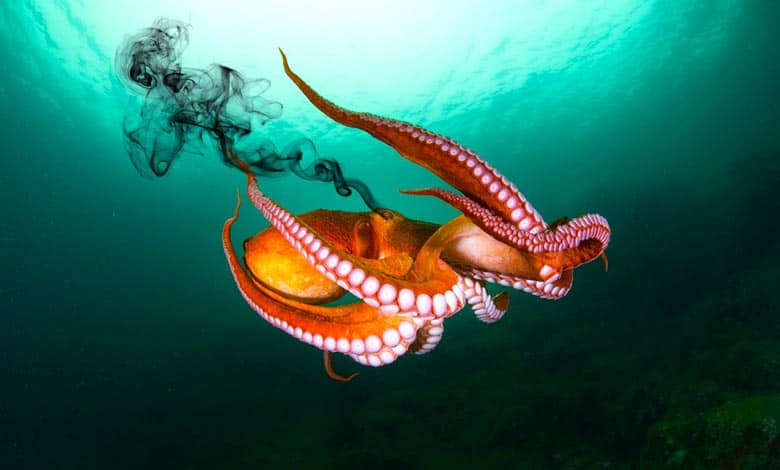
Hello, ocean explorers and marine marvel enthusiasts! Have you ever been fascinated by the mysterious world beneath the waves, where creatures of all shapes and sizes inhabit the vast blue? Among these amazing beings, the octopus stands out not only for its intelligence but also for its intriguing defense mechanism: the ability to squirt ink. Today, we’re diving deep into the question, “Why Do Octopus Squirt Ink?”
Octopus are mollusks that are invertebrates. It means they don’t have spines, and mollusk means soft. They are soft animals with no spine. The arms of an octopus cover the bottom of them. The bottom of every arm is covered in suction cups called suckers. Without suckers, the octopus wouldn’t survive. Two big ways they use their suckers are for moving around and catching things to eat.
But how do they protect themselves? They save themselves by using their cephalopod ink! Octopuses constantly learn about their environments and use that information to help them solve problems. Most scientists believe they have short-term memory, but these squishy sea creatures have a lot going on and are smarter than we thought.
So, grab your snorkels and prepare to submerge into the fascinating life of these eight-armed wonders. We’re about to uncover the secrets behind their inky escapes and what makes this behavior so incredibly cool. Ready to explore the depths? Let’s make a splash!
Why do Octopus Squirt Ink?
Octopuses have a unique defense mechanism where they can squirt ink. Here are the main reasons why octopuses use ink:
Camouflage and Escape: When an octopus feels threatened or senses danger, it releases a cloud of ink into the water. The ink is a visual distraction, creating a cloud that confuses potential predators and allows the octopus to escape from the immediate area. The ink cloud can disrupt the predator’s vision, allowing the octopus to retreat and hide.
Visual Confusion: The ink cloud released by an octopus can create a screen or barrier, making it difficult for predators to track the octopus visually. The ink particles can scatter light and create a visual smokescreen, temporarily impairing the predator’s ability to locate and target the octopus accurately.
Chemical Defense: The ink released by octopuses may also contain chemicals that deter or irritate predators. The chemicals in the ink can have an unpleasant taste or odor, potentially discouraging predators from pursuing or attacking the octopus.
Predatory Distraction: In some cases, octopuses may use ink as a hunting strategy. They can release ink to disorient or confuse prey, making it easier for the octopus to catch them. By using ink as a tool, octopuses can enhance their hunting success.
Octopus squirt their ink to create confusion for predators and send alarms nearby their colony to seek help. They can squirt ink when they feel threatened. It also acts as a visual alarm cue for others in the area. Scientists think the ink may also be a chemical alarm so their brothers or cousins can help them.
Some octopuses can produce luminous ink that contains light. It comes out as glowing ropes or something resembling a shower of sparks. They used it to blind or distract a potential predator. The evolution of ink helps them to survive.
Their ink is called cephalopod ink. Cephalopods release ink as an escape mechanism to clear the misconception that they are used as an offense. It is located between their gills and their breathing organs. Their ink is dispersed more widely when they use their siphon, a tube-like structure. Cephalopod ink is of dark color because of the pigment melanin, the same pigment in us. It also contains mucus.
- The ink is a mixture created by two separate glands: the funnel organ and the ink gland.
The ink gland is responsible for the color, like a black-brown hue, courtesy of melanin’s pigment. The funnel organ is located in the siphon, the tube-like organ that cephalopods use to expel water, waste, and ink. It releases mucus and the pigments of the ink glands into the water.
How does Octopus squirt ink?
Octopus ink is made of tyrosinase, dopamine, L-DOPA, trace amounts of amino acids, taurine, aspartic acid, glutamic acid, alanine, and lysine. Octopuses and other cephalopods use it to run away from predators, camouflage, and other purposes. But how do they do so?
Octopuses have a mantle that contains their stomach and the mantle cavity, a space that fills with water. They have an ink sac that creates the ink pigment. When the ink sac expels ink, it gets excreted from its anus and mixes with the water from the mantle cavity. They quickly squeeze the ink, which propels them forward and creates a cloud of confusion! They then camouflage, and whoosh, a save for day and life.
Can octopus ink kill you?
Their ink contains a compound called tyrosinase, which is a toxin. Suppose your eye contact with this chemical then causes a blinding irritation. You will not die, but you can lose your eye. So be careful when you visit them.
I hope you’re feeling a bit more connected to the mysterious life beneath the ocean’s surface and inspired by the adaptability and resourcefulness of these cephalopods. The ocean is full of wonders waiting to be discovered, and each creature has its tale of survival and adaptation.
So, the next time you find yourself gazing into the aquatic abyss, remember the clever octopus and its inky shield. Until our next adventure into the natural world, keep your curiosity afloat, and may you always find joy in uncovering the mysteries of our planet.
More Articles:
References:
Hanlon, Roger T., and Messenger, “Cephalopod Behaviour”, Cambridge University Press.
Bush, Stephanie L.; “Ink utilization by mesopelagic squid.” Marine Biology.
Caldwell, Roy. “An Observation of Inking Behavior Protecting Adult Octopus bocki from Predation by Green Turtle (Chelonia mydas) Hatchlings.”
